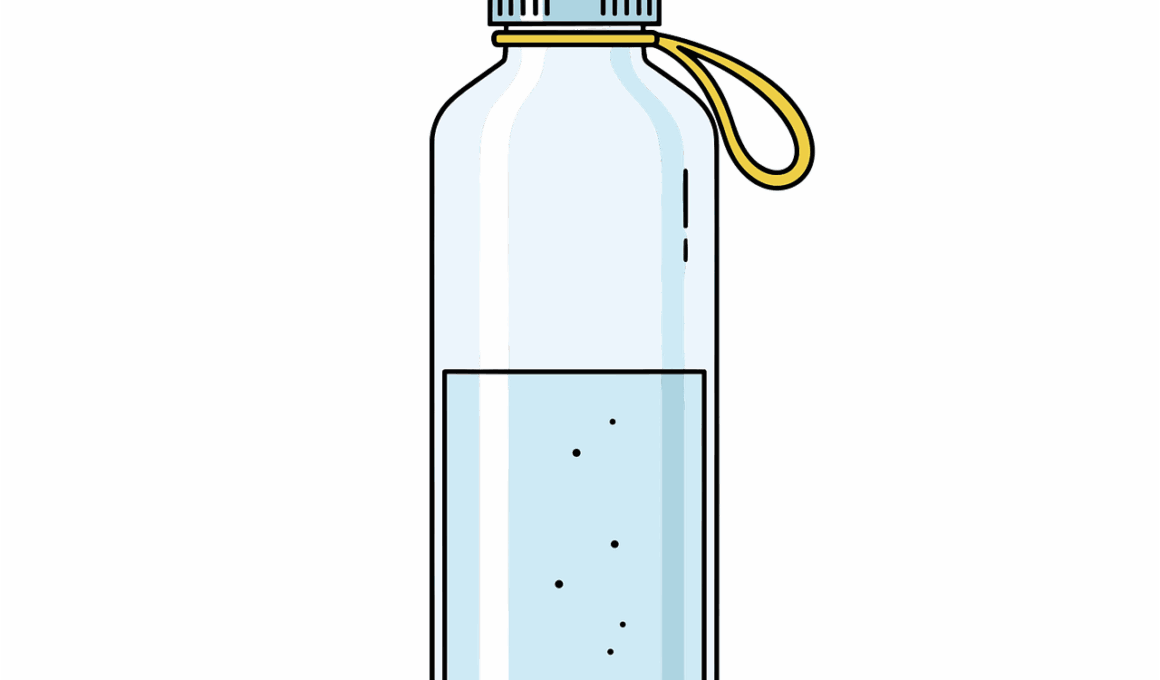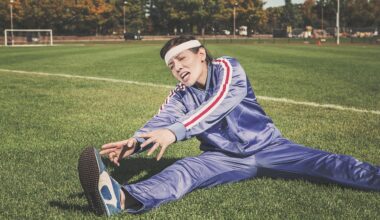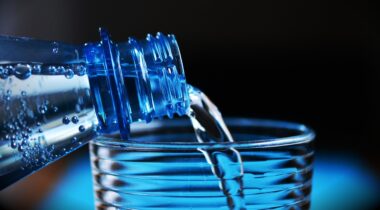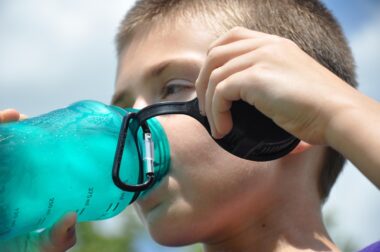Mindful Ways to Track Your Hydration Levels for Better Fitness
Staying properly hydrated is essential for anyone seeking to enhance fitness performance, muscular recovery, and overall health. To illustrate, hydration plays a critical role in regulating body temperature, lubricating joints, and transporting nutrients to cells. It is vital to maintain an awareness of fluid intake throughout your day, particularly when engaged in fitness routines or intensive workouts. Mindful hydration goes beyond merely drinking water; it incorporates a thoughtful approach to monitoring fluid needs according to various factors such as activity level, climate, and body composition. By being intentional about hydration, individuals can avoid the pitfalls of dehydration that may lead to diminished exercise efficacy and potential health issues. A practical starting point includes carrying a water bottle while exercising, thus fostering a habit of regular sipping. Additionally, incorporating hydrating foods like cucumbers, watermelon, or oranges can also contribute significantly to overall hydration. Setting reminders on your phone or employing hydration tracking apps enhances accountability for fluid intake. Paying attention to color clarity in your urine can signify adequate hydration, making you more attuned to personal hydration needs. Mindfulness in hydration ultimately enhances fitness outcomes and boosts daily energy levels effectively.
To facilitate mindful hydration practices, it’s essential to understand individual hydration needs. Various factors influence these requirements, including age, gender, body weight, physical activity, and ambient temperature. For instance, athletes typically need more fluids than sedentary individuals. Similarly, women generally have different hydration needs than men, due to variations in body composition and hormonal fluctuations. A useful strategy to gauge your water intake is to use a simple formula: take your body weight in pounds, divide it by two, and aim for that number in ounces of water daily. For example, a 160-pound individual would target about 80 ounces. Strive to prioritize drinking water over sugary beverages, as hydration strategies should emphasize health and well-being rather than empty calories. Establish daily hydration goals, and track your consumption using mobile apps or journals, allowing for adjustments as necessary. Moreover, when exercising, hydrate strategically according to your workouts’ intensity and duration. Planning hydration before, during, and after workouts guarantees optimal performance. Aligning your fluid intake patterns with your fitness goals can lead to noticeable improvements in your overall physical health and sports performance.
Effective Strategies for Mindful Hydration
Implementing effective strategies can significantly support the practice of mindful hydration in your daily fitness routine. A practical step includes setting specific hydration reminders throughout your day, perhaps through smartphone applications or alarm systems. These prompts can inspire you to drink water consistently, especially during busy periods when hydration can be overlooked. Another approach is to emphasize drinking a glass of water before meals and snacks, promoting better nutritional choices and digestion. Pairing hydration with routine activities, such as drinking a glass of water when you finish a workout, will create consistency. As you monitor your hydration levels, consider logging your intake to recognize patterns and areas needing improvement. Incorporating cues into your surroundings, such as keeping a reusable water bottle in plain sight or using colorful cups, enhances the visibility of your hydration goals. Engaging in mindful moments, where you appreciate the act of drinking water, can improve your relationship with hydration. This practice allows you to develop a more conscious awareness of your body’s signals and hydration needs, ultimately improving your health and fitness success long-term.
Incorporating mindfulness into hydration involves paying attention to how your body feels before, during, and after exercise sessions. If you tend to feel fatigued or unmotivated, dehydration might be contributing to your discomfort. Tuning into your body’s signals allows for a more effective hydration approach tailored to your specific needs. Practicing mindfulness can also extend to meal planning, recognizing foods high in water content such as fruits, vegetables, soups, and smoothies. These can be excellent avenues for enhancing hydration levels. Limit consumption of dehydrating substances, including excessive caffeine and alcohol, which can detract from hydration efforts and overall wellness. Implementing mindfulness techniques, such as deep breathing or meditation before drinking, will create a more intentional experience. When consuming fluids, notice the taste, temperature, and texture, which can enhance satisfaction and enjoyment. Aim to cultivate a loving relationship with hydration, emphasizing its role in empowering your body during fitness. By appreciating the importance of hydration in your fitness journey, your overall performance can reach new heights, helping ensure that you feel energetic and ready for any physical challenge.
Tracking Hydration Progress
Regularly assessing your hydration status is integral to mindful hydration practices. Techniques vary depending on personal preferences; one method includes the use of hydration tracking apps available on mobile devices, which can streamline your hydration process. These applications often provide insights into water consumption goals, reminders, and progress parameters. Alternatively, adopting a journal or planner specifically for hydration tracking can also yield benefits. By jotting down the consumed amounts throughout the day, you can identify your habits and trends over time. A beneficial rule of thumb is to check your urine’s color regularly to assess hydration levels: pale yellow indicates proper hydration, while darker shades can indicate a need for more fluids. Emphasizing hydration alongside fitness assessments can improve overall results. Evaluate hydration strategies alongside body weight changes, exercise performance outcomes, and subjective feelings of energy and alertness. Collaborating with nutritionists, trainers, or health professionals can also provide tailored strategies for maintaining hydration levels. Harnessing these tracking techniques will promote accountability and encourage better hydration habits, laying a sound foundation for enhanced fitness levels and improved health as a result.
Another effective approach to maintaining hydration awareness is to personalize your hydration routine according to your unique lifestyle and fitness goals. Different sports or activities may require varied hydration strategies to handle losses from sweat and exertion levels. For example, endurance athletes may benefit from electrolyte-rich drinks, while those engaged in moderate intermittent training might focus solely on water intake. Maintaining a cohesive approach to hydration that aligns with training intensity ensures optimal performance outcomes. Consider measuring fluid intake with markings on your water bottle to create visual prompts for hydration goals. By associating these goals with specific times, such as during breaks or post-exercise, steadfast adherence becomes easier. Establishing a catchphrase or mantra to reinforce hydration mindfulness can also enhance these efforts. Surround yourself with supportive individuals, such as workout partners or groups who prioritize hydration awareness. Remember that focusing on daily hydration cultivates an empowering mindset leading to overall well-being. Through tailoring practices to your unique fitness regimen, you can create a hydration culture that fosters health and better performance outcomes.
Conclusion: Embracing Mindful Hydration
In conclusion, embracing mindful hydration practices is essential for anyone pursuing fitness. Developing a routine that includes intentional water intake, awareness of personal hydration needs, and using tracking methods will create a transformative impact. Each strategy serves to enhance your overall health and fitness journey as you gain greater insights into your body’s needs. As you become more adept in recognizing signs of dehydration, you improve your ability to respond effectively. By adopting hydration methods that support not only your physical performance but also your mental well-being, you cultivate a holistic approach to fitness. This mindfulness journey invites balance, where attention to hydration enables optimal exercise performance and nurtures recovery. Central to success is maintaining a routine that is flexible and adaptable yet grounded in awareness. Experiment with new strategies and evaluate what works best for your body over time. Allow your hydration journey to empower you as you navigate various fitness challenges. Ultimately, committing to regular mindful hydration can profoundly influence your overall fitness, enhancing not just performance but also improving everyday life and joy within physical activity.





